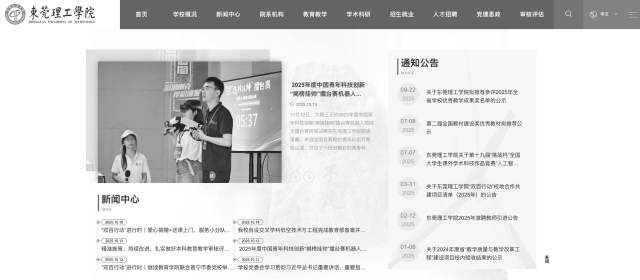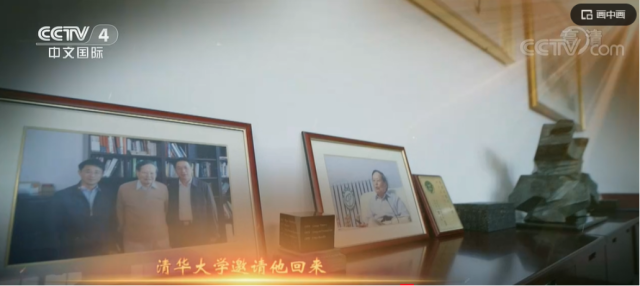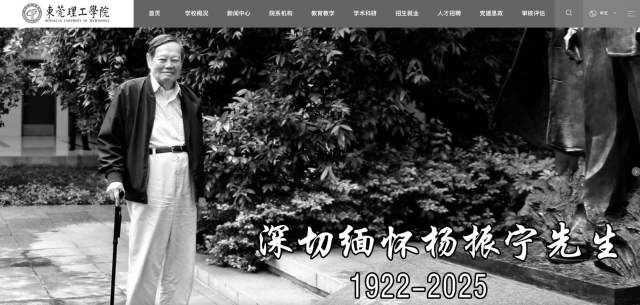On October 18, the world-renowned physicist, Nobel Prize laureate in Physics, academician of the Chinese Academy of Sciences, Tsinghua University professor, and honorary dean of Tsinghua University’s Institute for Advanced Study passed away in Beijing at the age of 103 due to illness.
During his lifetime, he maintained close exchanges with universities in Guangdong, and he described his relationship with Dongguan University of Technology as “unique.” By noon on the 18th, the official website of Dongguan University of Technology had turned black and white.

He had a deep connection with Dongguan University of Technology.
In the documentary “The Great Scholar,” when the camera panned through his Tsinghua University office, two special photographs appeared.

The first photo showed him in his Tsinghua University office with visitors from Dongguan University of Technology. The second photo captured him giving a lecture at Dongguan University of Technology, sharing the joy of learning and scientific research with teachers and students.
In 1993, he visited Dongguan University of Technology to deliver an academic report and was appointed as the honorary president of the university. He consistently followed the development and progress of the university—presenting four calligraphy works to encourage the university community, visiting the campus six times to guide and share the joy of learning and research with teachers and students, personally planting three rare trees on campus, and establishing the Yang Scholarship, Yang Building (Yang Research and Teaching Building), and Yang Class (Yang Innovation Class). His educational influence gradually took root and grew, becoming an integral part of the university’s culture.
In 2022, on the occasion of the university’s 30th anniversary, he specially sent two books as birthday gifts—”The Biography of Yang Zhenning” and “Morning Light Collection.”
“The Biography of Yang Zhenning” documents his academic career and scientific achievements, as well as his reflections on his homeland. “Morning Light Collection” includes representative articles he wrote, covering topics such as his statement on renouncing U.S. citizenship, discussions on accelerator and high-energy physics, recent research in the history of science, and various social issues including graduate student training, fully demonstrating his foresight and dedication to contributing to his homeland.
At that time, due to health reasons, he was unable to attend the university’s 30th-anniversary events in person but expressed his recognition of the university and his concern for its development through a video recording, encouraging the university to continuously strive for advancement in cutting-edge technology.
As early as 2018, Dongguan University of Technology established the country’s first “Yang Innovation Class,” specifically designed for cultivating top innovative talents among undergraduate students.
The university president recalled that in May 2018, the university proposed the plan to establish the country’s first “Yang Innovation Class.” After discussing the talent cultivation plan, he happily agreed: “I approve of running this class. I believe you will surely succeed!”
The head of the “Yang Class” explained that the innovation class emphasizes research-based teaching as a fundamental approach, adopts small-class teaching, offers freshman seminar courses, fully English-taught courses, and liberal arts courses, and creates a seminar-style, interactive classroom teaching environment.
After major分流 in the second year, each student is assigned a professional mentor who provides comprehensive guidance in learning, research, and competitions, helping them enter laboratories and research teams earlier to initiate their scientific research “enlightenment.” Students also have opportunities for overseas study and research.
To date, the “Yang Class” has had seven cohorts of students and has become a base and experimental field for the university’s undergraduate education and teaching reforms, cultivating applied research-oriented top innovative talents.



